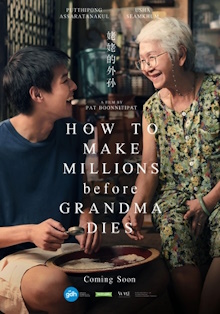This Thai film was a big surprise hit and since it’s on Netflix, I thought I’d give it a shot even knowing that it will likely be a sentimental tearjerker. It is indeed that but it also turned out to be a reasonably balanced, serious drama. The premise may be trite, yet director Pat Boonnitipat does a rather good job of portraying the dynamics within families with all of the bittersweetness that entails. I was also impressed by how good it looks as the interiors of the houses they use look like real places someone would live in. The recent spate of Malaysian films in which their interiors look like a set designer’s idea of a living space compare very unfavorably.
M is a university dropout who spends his time trying to be a video game streamer instead of getting a proper job. When his cousin Mui who has been taking care of their paternal grandfather inherits most of his wealth, he gets the idea of doing the same thing. His maternal grandfather Mengju has been diagnosed with late-stage cancer and lives by herself. M’s mother Sew has a modest job at a supermarket. The eldest son Kiang is reasonably well-off and lives in a nice neighborhood with his wife and young daughter. The youngest son Soei is a bum who works irregular jobs and is saddled with debts. M moves in with Mengju to care for her and help her with her business of selling congee by the street. In that role, he gains a better appreciation of the relationships between the family members and listens to Mengju’s stories of her children. He also realizes that both Kiang and Soei are intent on inheriting Mengju’s property after she dies just like he is. What’s more is that he realizes Mengju is herself aware of this as well and it doesn’t affect her love for her family members at all.
The premise makes it sound like the kind of sentimental, family-friendly pap that might win over the masses but have little artistic value. Indeed there are moments when the film leans on slow music to tug at the emotions of the audience rather than be confident in the power of its images. The wonder of this film is that it’s actually quite good because it’s bold enough to show both the ugliness of people and the painful moments at the end of one’s life. We’ve all seen plenty of dramas about family members who connive to inherit a rich relative’s money but this one goes further. Mengju knows her own children better than anyone else, certainly far better than they know her, so their motivations when they are extra nice to her or visiting more often than usual are transparently obvious. Yet such is her love for them that not only does she let them be, but she makes excuses for them to M. As he observes, a mother makes decisions not based on who cares for her the most but based on who she thinks most needs her care and that pattern is repeated generation after generation.
Several other details made this especially interesting to me. As a Malaysian, it was fascinating to get a look at the inside of a Thai government hospital. It was also educational how theirs is a Thai Chinese family and Mengju is somewhat resentful that her grandson doesn’t speak a word of Chinese. His confusing the word zhuangyuan for a eunuch is surely a joke only a Chinese speaker would get. In other ways however it remains a commercial mainstream film. Notice how M’s mother is arguably the most filial of the three siblings as it wouldn’t do at all for him to be at odds with his own mother. M’s open antagonism towards his uncles makes for gripping drama and gets the story moving at a good clip but I have a hard time believing that such behavior would be acceptable in an Asian family. Most of all, the film wants to convey the message that M taking care of Mengju as she is dying only makes him love and appreciate her more. But as any adult can tell you, the opposite is usually true. The physical and psychological demands of taking care of an adult with a failing body is so overwhelming that it’s almost impossible not to feel resentment instead. The film wants to assert the traditionalist view that the elderly ought to be cared for by their relatives instead of in a nursing home. But even here, it’s only possible because M took it on as a full-time job without being paid, which is highly impractical.
It’s seems that this was originally intended to be a comedy and I shudder to think how that would have turned out. Boonnitipat himself is Sino-Thai and his involvement in the project made it both more emotional and more authentic. This depiction is still too idealistic in showing how the younger generation would react to the death of an elder in the family but it is set in a contemporary Thai society that feels reasonably plausible. It’s a strong showing for a first-time director and certainly something worth watching.
